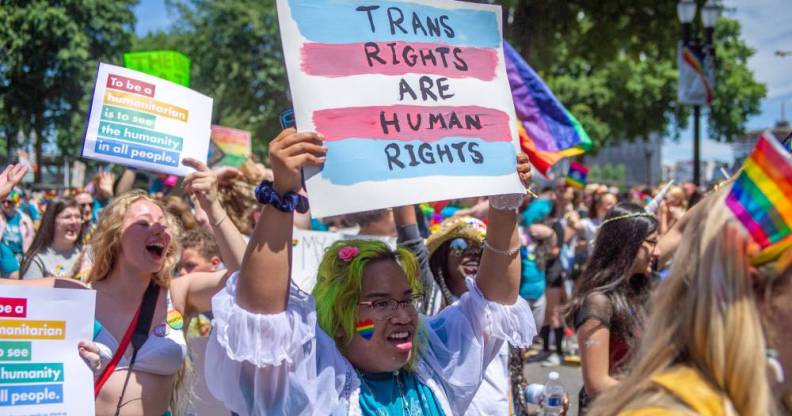Ban on abhorrent gay and trans panic defence unanimously passed by Oregon

A person displays a sign reading “Trans Rights are Human Rights” during the Portland Pride Parade and Festival in 2019. (Diego Diaz/Icon Sportswire via Getty Images)
Lawmakers in Oregon have unanimously passed a measure that bans the gay and trans panic defence in legal proceedings.
The state’s House of Representatives on Thursday (13 May) passed Senate Bill 704 by an unanimous 54 person vote. The bill would put an end to legal defences that claim a victim’s sexual orientation or gender identity is to blame for a defendant’s violent or lethal reaction.
SB 704 previously passed by a nearly unanimous 29-1 vote in April. The bill now goes to Democratic governor Kate Brown to be signed into law.
If it passed into law, it would make Oregon the 14th state to ban the gay and trans panic defence. Vermont banned gay and trans panic defences earlier this month, joining 12 other states and Washington DC in prohibiting the use of such defences in legal cases.
Currently 37 states (including Oregon) do not prohibit the use of legal defences claiming the victim’s sexual orientation or gender identity contributed to the defendant’s actions.
Oregon’s SB 704 states the “discovery of a victim’s actual or perceived gender, gender identity, gender expression or sexual orientation does not constitute reasonable explanation for extreme emotional disturbance or purposes of affirmative defense to murder in the second degree”.
Karin Power, a Democratic representative, told the Los Angeles Blade that the passage of the bill will “send a strong and proactive message that the perpetrator of a second-degree murder will not be able to excuse the crime simply based on who their victim is”.
“Defendants use these defences in an effort to avoid full accountability on the grounds that the actual or perceived sexual orientation or gender identity of the victim is reasonable in and of itself to be considered adequate provocation,” Power said.
LGBT+ advocacy group Basic Rights Oregon said in a statement the passage of the bill sends the “message that violence against LGBTQ people is never acceptable”. The group added it also meant lawmakers were “showing up for Black, Indigenous and Latinx transgender women who experience disproportionately high rates of violence”.

